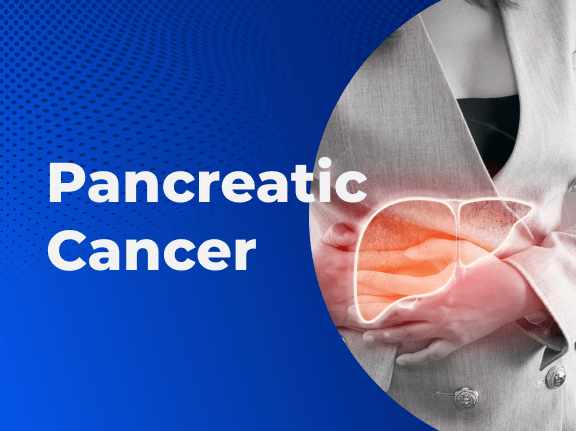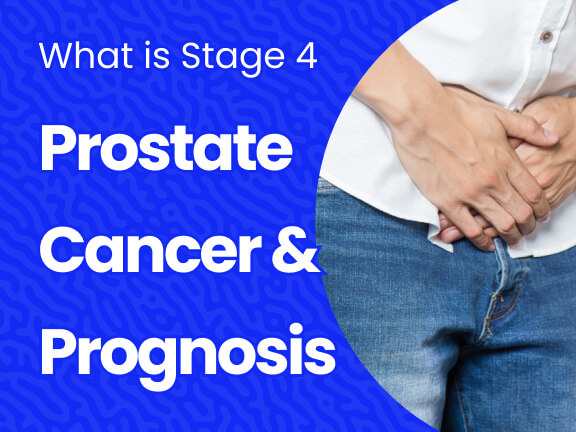What is Pancreatic Cancer?
Pancreatic cancer begins in the pancreas. There will be over 56,000 new pancreatic cancer cases this year which makes up slightly more than 3% of all cancer cases, making it the 11th most common cancer type today. Despite being 11th in number of cases, this cancer type is 3rd in cancer deaths in the United States. Over 89% of pancreatic cancer patients are at least 55 years of age, making it rare in younger adults. Adenocarcinoma is the most common type of pancreatic cancer, followed by Pancreatic neuroendocrine tumors (NETs).
Pancreatic Cancer Symptoms
One of the reasons pancreatic cancer is so difficult to treat is that many patients do not show signs or symptoms in early stages. Symptoms typically occur once the tumor has grown, or the cancer has spread to the surrounding tissues. However, some patients may experience these symptoms:
- Jaundice, yellowing of the skin and/or eyes
- Itching of the skin
- Changes in stool
- Dark urine
- Nausea or vomiting
- Weight loss due to poor appetite
What Causes Pancreatic Cancer?
Doctors do not know the exact cause of pancreatic cancer. However, observed changes in individual genes that are both inherited and developed over one’s lifetime do develop into cancer. Only a small number of cases develop from gene mutations inherited from family members. Most gene mutations attributed to pancreatic cancer occur after they are born. The common gene mutations seen in pancreatic cancer include:
- P16
- TP53
- KRAS
- BRAF
- DPC4 (SMAD4)
Pancreatic Cancer Risk Factors
The following risk factors are believed to increase an individual’s chance of developing pancreatic cancer:
- Age, nearly all patients are over the age of 45 and the average age at diagnosis is 70
- Gender, men are more likely to develop pancreatic cancer
- Family history of pancreatic cancer
- Inherited genetic mutations account for 10% of all pancreatic cancer cases
- Tobacco use
- Obesity
- Diabetes
- Pancreatitis
Pancreatic Cancer Prevention
There is no way to guarantee someone will not develop pancreatic cancer, but there are steps you can take to minimize your risk.
- Avoid overconsumption of alcohol
- Limit exposure to harmful chemicals
- Avoid smoking
- Maintain a healthy weight and consume a balanced diet
- Exercise multiple times a week
Pancreatic Cancer Treatment
Five treatment methods are often utilized with pancreatic cancer patients. They include:
- Surgery (Whipple procedure), this is the first treatment option considered, however not all patients are eligible
- Radiation therapy, can be given after surgery and is sometimes combined with chemotherapy
- Chemotherapy, can be given after surgery and is sometimes combined with radiation therapy
- Targeted therapy
- Immunotherapy
- New research treatments in clinical trials
Pancreatic cancer is only resectable if it has not spread to tissues surrounding the pancreas. The treatment decision mainly considers the stage, but also the overall health of the patient.
Download Your Pancreatic Cancer Guide
Pancreatic Cancer Clinical Trials
There are approximately 321 clinical trials for pancreatic cancer that are currently recruiting patients in the United States right now. With such an extensive list, many of them could be beneficial for you. Our team of patient relations coordinators, who are oncology nurses, and our artificial intelligence-based clinical trial matching system will find the best option for you.
With just a few clicks, you can see your clinical trial matches now. Click here
How Do We Help Pancreatic Cancer Patients?
Massive Bio offers an independent cancer treatment analysis as well as free clinical trial matching for pancreatic cancer patients. Our patient relations coordinators work closely with patients to gather information on their current medical status, and then will provide a list of options from available cancer clinical trials close to your home.
We can also provide a comprehensive case analysis through our Virtual Tumor Board from cancer specialists. The Virtual Tumor Board (VTB) is comprised of highly specialized oncologists from nationally-recognized Cancer Centers of Excellence. In just 7-10 days after receiving your medical records, we can get you a treatment plan without having to travel far distances and use your valuable time.
Source:












